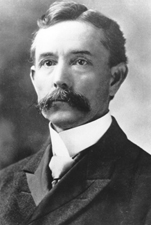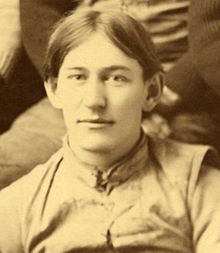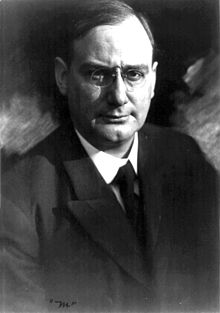Burton v. United States
Burton and his supporters argued that he was selectively prosecuted, on the orders of President Theodore Roosevelt, for political reasons.[3] The next year, Senator John H. Mitchell (R-OR) was convicted under the same statute for his role in the Oregon land fraud scandal.§ 3929 authorized the United States Postmaster General, "upon evidence satisfactory to him" that mail fraud was being committed, to instruct the post master at the fraudster's local post office to return registered mail addressed to the fraudster to the sender with the word "Fraudulent" written or stamped on the envelope.[8] The Rialto Grain and Securities Company, whose principal place of business was in St. Louis, Missouri, was under investigation by the Postmaster for mail fraud.[19] Witnesses against Burton at the grand jury included Chief Post Office Inspector William E. Cochran, Dennis, and W.B.Every person offending against this section shall be deemed guilty of a misdemeanor, and shall be imprisoned not more than two years, and fined not more than ten thousand dollars, and shall, moreover, by conviction therefor, be rendered forever thereafter incapable of holding any office of honor, trust, or profit under the Government of the United States.[21]The first and second counts of the indictment pertained to the receipt of the final cash payment from Rialto with reference to two separate interests of the United States.[11] Article One provides that senators and representatives "shall in all Cases, except Treason, Felony and Breach of the Peace, be privileged from Arrest during their Attendance at the Session of their respective Houses, and in going to and returning from the same.[20] Judge Elmer B. Adams, sitting as the United States Circuit Court for the Eastern District of Missouri, presided over Burton's trial.Inspector Cochran testified that Burton had attempted to discuss the case with him the day his indictment was made public.[26] Further, Cochran testified that, on February 5, 1902, Burton had told him that he wished to represent Rialto before the Department for a fee, having been assured by other senators that such conduct was common and legal.[27] Burton testified that he received notice of his appointment from Harlan on November 20, 1902, and that he had only contacted the Post Office to notify them of his intent to defend Dennis in a criminal case.[30] Before the Supreme Court, on November 30 and December 1, 1904, Burton was represented by (former judge) John Forrest Dillon and (future Solicitor General) Frederick William Lehmann at oral argument, with Harry Hubbard and W.H.Without any discussion of the merits, 5-4, the Court held that the indictment stated offenses under § 1782 and that the evidence was sufficient for the jury to have convicted Burton.The payment of the money was in Washington, and there was no commencement of that offense when the officer of the Rialto Company sent the checks from St. Louis to defendant.[50][51] The first, second, fourth, sixth, and eighth counts charged that Burton had agreed to receive compensation from Rialto.[53] While the indictment was pending, Burton was robbed in Chicago and his wallet was recovered in a mail box by postal employees.[52] In addition, he was "rendered forever hereafter incapable of holding any office of honor, trust or profit under the Government of the United States."[52] The second time before the Court, on April 3–4, 1906, Burton was again represented by Dillon and Lehmann, plus Bailey P. Waggener, again with Hubbard and Rossington on the brief, plus W. Knox Haynes and W.P.[62] Assistant Attorney General (and future judge) Charles Henry Robb represented the United States.That same day, another of Burton's lawyers, former Senator John Mellen Thurston, filed a petition for rehearing, which operated as a 60-day continuance, and in effect stayed the matter much longer because the Court was set to adjourn until October."[62] A later article noted that, "[t]he decision is especially interesting because of the large array of legal talent in the case and the ingenious argument made by Bailey Wagner [sic] of Topeka that the Senate is the judge of the qualifications of its own members ."[66] Burton also argued that the provision rendering those convicted under § 1782 "incapable of holding any office of honor, trust or profit under the Government of the United States" unconstitutionally infringed on the Qualifications Clause.[I]t is, we think, a mistake to say that the United States was not interested, directly or indirectly, in protecting its property, that is, its mails and postal facilities, against improper and illegal use .[71] The dissenters argued that the majority's interpretation would find the United States interested in any administrative proceeding, thus rendering the statutory words "before any Department, court martial, bureau, officer, or any civil, military, or naval commission whatever" to be mere surplussage.[82] The Court further cited its earlier precedents holding that the venue provision of Article III does not require the physical presence of the defendant in the forum state.[85] On January 22, 1906, Burton appeared in the Senate chamber again, for 30 seconds, in order to be eligible for $1,000 in travel reimbursements from the federal government.[87] Burton pointed out that his was the first prosecution under § 1782 and that numerous other public officials before him had potentially violated it, under the interpretation that prevailed in the Supreme Court.[88] When the next vacancy opened on the Eighth Circuit, Burton and his allies favored the appointment of Charles Blood Smith.[88] Roosevelt was enraged, demanded the return of the letter, and declared that "from now on Burton would be considered politically a Democratic Senator, as far as patronage is concerned.





Bruton v. United StatesSupreme Court of the United StatesJoseph R. BurtonUnited States Postmaster Generalmail fraudvicinageRevised StatutesTheodore Rooseveltfirst memberUnited States Senatepublic corruptionJohn H. MitchellOregon land fraud scandalRev. Stat.registered mailmoney ordersSt. LouisMissouriattachmentRiggs National Banktelegramindorsed and depositedfederal grand juryUnited States District Court for the Eastern District of MissouriHorace DyerElmer B. AdamsAllen chargesupersedeas bondUnited States Court of Appeals for the Eighth CircuitL. Ed.Melville FullerJohn M. HarlanDavid J. BrewerHenry B. BrownEdward D. WhiteRufus W. PeckhamJoseph McKennaOliver W. Holmes Jr.William R. DayU.S. Const. amend. VIJohn Forrest DillonFrederick William LehmannHenry M. HoytArticle IIIVicinage Clausenegotiable instrumentHouse of Lordsjury instructionsJohn Henry RogersWestern District of Arkansasby designationChickasawWillis Van DevanterU.S. Const. amend. VCharles Henry RobbJohn Mellen ThurstonArticle Oneseparation of powersUnited States Court of Claimsat the timesurplussageReconstruction Eralegislative historyDouble Jeopardy Clauseoffer and acceptancecontractUnited States Senate Committee on Privileges and ElectionsIron CountyIronton, MissouriJoseph W. FolkAbilene, Kansas1900 Republican National ConventionWilliam Cather HookChester I. LongWillis J. BaileyJerusalemSt. Louis World's FairJoseph L. BristowWilliam McKinleybeet sugarJed S. RakoffFederal prosecution of public corruption in the United StatesMail and wire fraudhonest services fraudHobbs ActTravel ActRacketeer Influenced and Corrupt Organizations ActForeign Corrupt Practices ActForeign Extortion Prevention ActProgram briberyGlasser v. United StatesUnited States v. JohnsonMcNally v. United StatesSkilling v. United StatesOcasio v. United StatesMcDonnell v. United StatesKelly v. United StatesCiminelli v. United StatesPercoco v. United StatesSnyder v. United StatesFederal officialsState officialsLocal officialsUnincorporated territory officialsAbscamAlaska political corruption probeBRISPECOperation Bid RigOperation Board GamesOperation BoptrotOperation GreylordOperation G-StingOperation Mississippi HustleOperation Plunder DomeOperation PretenseOperation Rocky TopOperation Silver ShovelOperation Tennessee WaltzCongressional insider trading scandalCongressional Post OfficeCunninghamJack Abramoff CNMIHouse bankingJames A. Kelly, Jr.KoreagateOregon land fraud